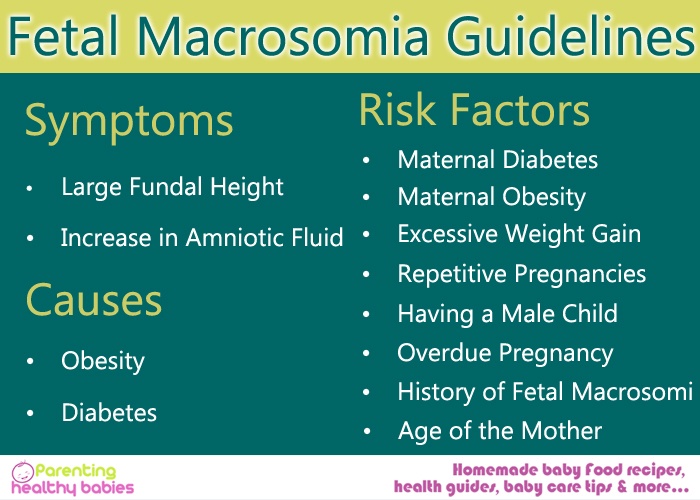Fetal macrosomia is medical condition where a baby is born with more weight and size than usual. In case of this disease, a child might have a birth weight of more than 8 pounds or 4000 grams. About 9 percent of children, worldwide, are born with this syndrome.
The risk factors associated with this disease increases as the weight of the child increases to around 4500 grams. Fetal macrosomia can tend to complicate the chances of vaginal delivery. It can also put the baby in the risk of fatal injury during the birth process. The baby is exposed to increased problems related to health after the birth.
Read More: Fetal Alcohol Syndrome: Symptom, Cause, Risk, Prevention
Symptoms of Fetal Macrosomia
It is very difficult to detect this disease, during the pregnancy. That is why the disease is all the more risky. It can remain undiagnosed for a very long time. These are the common symptoms of fetal macrosomia:
Large Fundal Height
Your doctor can skip out on measuring the fundal height, during your pregnancy. This height is the distance between the top of uterus and the pubic bone. A larger fundal height is a very prominent symptom of fetal macrosomia.
Increase in Amniotic Fluid
If the amount of amniotic fluid is higher, then it is a sign that the baby is larger than average. Amniotic fluid is an amount of urine output of your baby. The increase in size of the child might also increase the amount urinal output.
So far these are the symptoms which can be detectable, as far as the disease is concerned. But it is also essential to know the causes which trigger this kind of syndrome.
Causes of Fetal Macrosomia
If you are suffering from obesity or diabetes then fetal macrosomia can be a possibility. It is mostly caused due to genetic disorder. It is not the baby who induces such massive growth.
Also there is certain amount of unexplained cases where the increase of the baby’s weight cannot be determined.
Read More: Must Have Vaccines During Your Pregnancy
Risk Factors Associated with Fetal Macrosomia
There is more than one factor which initiates the risks of fetal macrosomia. There are certain things you can control. But others are out of your hands. The following are the common risk factors associated with the disease:
Maternal Diabetes
If you are already suffering from diabetes, before pregnancy, then the chances are high that your baby might get exposed to the risk of fetal macrosomia. If you have neglected your diabetic tendencies, before pregnancy, your baby might end up with larger shoulders and a huge amount of body fat.
History of Fetal Macrosomia
If you have already given birth to a child with fetal macrosomia, then chances are that your next child will also end up with that disease. Also if you, yourself were an overweight child, during your birth, the risk of the disease remains.
Maternal Obesity
If you are suffering from obesity, then chances are high that your child will suffer from the disease. History of obesity in the family also keeps this risk alive.
Excessive Weight Gain
If you are gaining excessive weight during your pregnancy then you can put your fetus at the risk of this disease. This is also concern for the mothers who were previously obese and again gaining weight during pregnancy.
Repetitive Pregnancies
Studies show that the weight of the child increases upon each pregnancy. For that reason if you are repetitively giving birth to children, then you are putting the new born to risk of being born with a greater body mass than the others.
Having a Male Child
This is something you cannot help. But it is true that male children weigh more than the female counterparts. Male children are at a greater risk of suffering from this disease.
Overdue Pregnancy
If your pregnancy is overdue for more than two weeks then there is a high chance that your baby will weigh more than normal. That is why overdue pregnancies increase the risk of fetal macrosomia.
Age of the Mother
The age of the mother is also another critical factor influencing the weight of the child. Women who are more than 35 years old tend to give birth to larger children than younger women.
Therefore, fetal macrosomia is mostly the result of diabetes, maternal obesity, and excessive weight gain during pregnancy amongst other causes. These are the conditions which you can control and cater to. You can consult with your doctor and undergo tests to make sure that you recover from these conditions and put your child out of the danger zone.
Read More: Vaccines You Need Before Getting Pregnant
Complications & Problems
Fetal macrosomia puts both the mother and the baby at risk. There are many health complications which are likely to arise due to fetal macrosimia.
For the Mother:
- The mother can face serious labor problems and injuries in the vaginal section.
- It can rupture the birth canal of the mother and cause permanent damage.
- The mother can face severe bleeding post delivery. This might even lead to weakness.
- It can also rupture the mothers uterine. This will create long term problem for the mother. Her entire urinary tract will not only get injured but also will be exposed to severe infections in the future.
For the Child:
Like the mother, the new born child also undergoes several complications. The disease tends to harm the new baby in more than one ways.
- If the child is diagnosed with fetal macrosomia then his/her blood sugar level will be lower than normal. This will give rise to further complications in his/her life. It will make them weaker than the other kids and dizziness will be a constant problem.
- The child might face early childhood obesity. According to research diseases like this increases the tendency of obesity for the new born child.
- His/her blood pressure might be increased than normal.
- His/her blood cholesterol level will also be on the higher side.
- There will be abnormal amount of fat decomposition around the waist.
- The blood cholesterol level will also be on the higher end.
- The child will be exposed to early age heart problems.
- The threat of diabetes will also be there for the child.
There are still researches going on to determine how much this disease impact the adult life of the child. However, till date, prevention, done by the mothers, is the only suggested cure for this disease.













